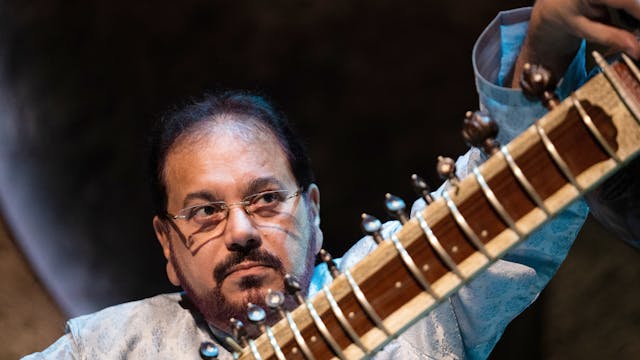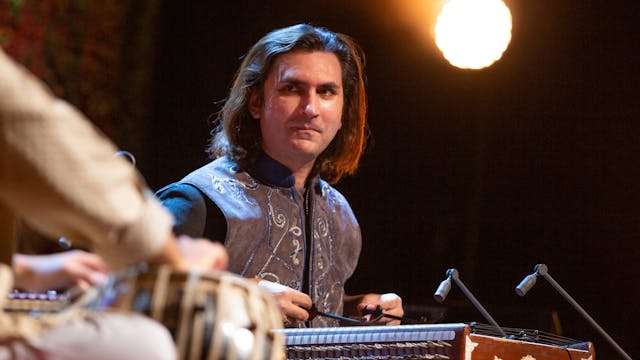Shubha Mudgal | Full Concert
Full Concert
•
1h 41m
Recorded at Darbar Festival 2016, on 18th September, in the Royal Festival Hall, at London's Southbank Centre.
Musicians:
- Shubha Mudgal (khayal)
- Aneesh Pradhan (tabla)
- Sudhir Nayak (harmonium)
- Priya Sharma & Seetal Dhadyalla (tanpuras)
Music Pieces:
- Raag Bhimpalasi, Thaat: Kafi, Samay: afternoon
- Raag Shyam Kalyan, Thaat: Kalyan, Samay: early evening
- Thumri in Mishra Tilak Kamod
- Jhoola in Mishra Kafi
Renowned for a strong social conscience that advocates respectful treatment of women in Indian classical music, Shubha Mudgal’s performances are the result of an eclectic and magnificent repository harvested from a wide range of gurus - notably, Ramashreya Jha ‘Ramrang’, Vinaya Chandra Maudgalya, Vasant Thakar, Jitendra Abhisheki and Kumar Gandharva.
She fortuitously combines her musical flair with the strong force of her personality to uncover fresh perspectives within known and unknown territories alike. In this video from 2016, she performs Raag Bhimpalasi and Raag Shyam Kalyan followed by two lighter pieces.
Sudhir Nayak gives her a soothing support on the harmonium while Aneesh Pradhan captures each piece in its essence with incisive tabla accompaniment.
Her voice works its sultry magic with an alap in Bhimpalasi. With sparse, sustained notes, she culls a number of phrases, engraving Bhimpalasi’s exquisite image underscored by its haunting tug. The vilambit bandish set to Rupak taal was written and composed by her guru Pandit Ramashreya Jha (1928-2009). The faster composition in Teental is another gem from her chest – a composition of Azmat Hussein Khan (1911-1975).
Bhimpalasi’s blossoming is secretly and delicately tied to a slightly higher microtone of komal Ni (flat 7th) in its phrases. Working the delicate threads of the raga, Mudgal creates a deep texture and heightens its beauty with immaculate focus on the microtonal accuracy around this note.
She presents another bandish in Raag Shyam Kalyan set to drut Ektaal. ‘Bela Sanjh Ki Sughara Suhavno Bhayo Ri Ali’ which translates to ‘what a beautiful evening has arrived today,’ is another composition by her guru Pandit Jha. Known particularly for his strict adherence to lyrics, Pandit Jha carves an image using Lord Krishna as a metaphor for a beautiful evening and the devotee’s surrender to the Lord by embracing its beauty.
Leveraging on the broad canvas provided by Mishra Tilak Kamod, Mudgal progresses with grace and freedom, delineating the romance between Lord Krishna and Radha in a thumri. She elucidates the textural flow of its lyrics unhurriedly, her voice floating effortlessly and lapping each sentence with subtle nuances.
Pradhan softly punctuates her singing, weaving a fine layer of rhythm that forms a touching, relishing interpretation of the romance inherent in this piece.
Mudgal’s concluding number is a jhoola in Mishra Kafi. A lyrically captivating semi classical piece, the lucid appeal of its rustic charm forms delicate treasures of a repertoire that Mudgal brings with her semi classical training from Naina Devi (1917-1993), arguably one of the finest thumri exponents of the 20th century.
Up Next in Full Concert
-
Pravin Godkhindi | Director's Cut
Recorded at Darbar Festival 2017 on 9th November at Sadler's Wells, Islington, London.
Musicians:
- Pravin Godkhindi (bansuri)
- Supreet Deshpande (tabla)Music Pieces:
- Raag Maru Bihag, Thaat: Kalyan, Samay: late evening
- Raag Jog, Thaat: Kafi, Samay: late evening
- Dhun in Mishra PahadiIn...
-
Pandit Kushal Das | Director's Cut
Recorded at Darbar Festival 2021 on 24th October at the Barbican Centre, London.
Musician:
- Pandit Kushal Das (sitar)Raag Parmeshwari; Samay: Late Morning
Pandit Kushal Das, a master of sitar and surbahar, follows in the footsteps of Pandit Nikhil Banerjee's Maihar tradition. Despite growing...
-
Rahul Sharma | Director's Cut
Recorded at Darbar Festival 2009, on 3rd April, at the Purcell Room of the Queen Elizabeth Hall, at London's Southbank Centre.
Musicians:
- Rahul Sharma (santoor)
- Pandit Subhankar Banerjee (tabla)Music Pieces:
- Raag Bhoopal Todi, Thaat: Bhairavi, Samay: Morning
- Raag Mishra Bhairavi; Thaat...



